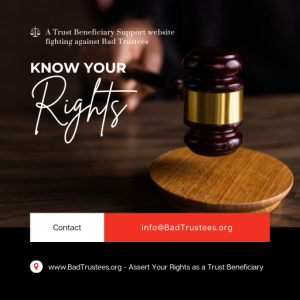Bad Trustees Newsletter
⚖️ What Happens in a Probate Court Trial?
⚖️ What Happens in a Probate Court Trial?Process of a Probate Court TrialA probate court trial is...
Strategy on getting a trustee to settle before having to go to trial
Strategy on getting a trustee to settle before having to go to trialTrying to settle with a Bad...
Who is the respondent in a probate case?
Who is the respondent in a probate case?The Respondent In a probate case, the "respondent" is the party against whom a petition or objection has been filed, essentially the person being challenged or opposing the petition. Here's a more detailed explanation: Probate...
What are the duties of a Trustee?
A trustee has a fiduciary duty to act in the best interests of the beneficiaries, including duties of loyalty, impartiality, and management.
What is an 850 petition?
In California, an “850 petition,” also known as a Heggstad petition, is a legal tool used to request a court order to transfer or confirm ownership of property that is believed to belong to a trust or estate but is held by another party, often to avoid a formal probate process.
Tactics of a lying and deceitful Trustee
A lying trustee can use various tactics to deceive beneficiaries, conceal their actions, or avoid accountability.
What is a breach of fiduciary duty in probate?
A breach of fiduciary duty in probate occurs when an executor (or trustee) fails to act in the best interests of the beneficiaries or the estate, violating their fiduciary duty.
How to prepare for probate mediation
How to prepare for probate mediationProbate Mediation PreparationOkay, probate mediation is a fantastic way to resolve disputes efficiently and cost-effectively. But it requires preparation. Here's a breakdown of how to prepare for probate mediation, broken down into...






